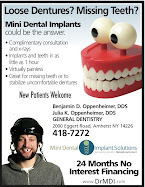Are you missing one, two, or more teeth? Do you hide your smile because of missing teeth or spaces between your teeth? Do you lack confidence when you smile, speak or eat? Do you have trouble speaking, eating, or chewing? Do you have dentures that slip or cause sore spots? Do you have loose teeth, or advanced gum disease?
Missing teeth affect so many aspects of a person’s life and health. Remaining teeth shift, rotate and become crooked, causing an improper bite, as well as problems with chewing and digestion. Spaces and gaps between teeth often cause embarrassment, problems with speech, and lack of self-esteem. Patients with dentures of some sort – either partial or full are often uncomfortable or concerned about the partial falling out, and refrain from using it at all.
Imagine living in Buffalo and not being able to eat the things we love including chicken wings and beef on 'weck', hamburger instead of steak, or giving up on corn on the cob or apples because it’s embarrassing.
Today dental implants represent one of the most dramatic advances in modern dentistry, providing people a second chance for their teeth, and it’s important to understand what they are, how they work, and which ones are right for you.
What are dental implants?
A natural tooth consists of a crown (the part of the tooth that you see above the gum), and the root (the part of the tooth that is hidden under the gum and within the jawbone). The root is what actually holds the natural tooth in place. When a person is missing a tooth, the dentist decides how to recreate the crown portion, and the best method to hold it in place. This is why dental implants were created.
How do they work?
Dental implants are metallic cylinders that are placed into the jawbone where the original teeth once existed. These root-like cylinders are used to secure a replacement tooth in the spot where the tooth is missing. They can also be used to secure loose dentures, allowing them to function better and last longer.
Dental implants are made of various biomaterials. Usually a surgical metal called titanium is used because it is the most compatible with human biology. They are surgically placed in the jawbone, right in the dentist’s office, using a local anesthetic.
If you’ve heard that implants won’t work, or that they’re too expensive, you’ve been misinformed. Make sure you talk to a skilled clinician who can understand your needs. Today implants come in all shapes and sizes, including new mini implants. The technology has come a long way. What’s important is determining what works for you and what you can afford. Approved and tested implant systems are very successful. In fact, research shows more than 90% success rate at 20 years. Patients who take care of their new teeth can enjoy implants that last a lifetime.
About the Author:
Dr. Benjamin Oppenheimer is one of the leading experts in the world on mini dental implants. He offers free dental implant consultations, exam, x-rays and no interest two-year financing, 716-418-7272.
About Benjamin D. Oppenheimer, DDS, FICOI

- Dr. Benjamin D. Oppenheimer
- Amherst, NY, United States
- Dr. Benjamin D. Oppenheimer is a graduate of the University at Buffalo School of Dental Medicine. There he received a Dean's letter for Academic Excellence as well as the International Congress of Oral Implantologists award. He is now one of the leading experts in the world on Mini Dental Implants and a fellow of the ICOI. He has taught hundreds of dentists to use minis and has served as a consultant to the IMTEC Corporation, the manufacturer of the MDI product as well as Dental tech laboratories, Evolution Dental, Global Dental Sciences. He currently is a Key opinion leader to 3M ESPE Dental Implants. He is also the author of a number of scientific journal articles on the subjects of dental implants, bone grafting, mini dental implants and Cone Beam CT for dentistry. As well as offering dental implants, Dr. Ben provides all aspects of patient care for adults and children in Amherst, NY a suburb of Buffalo NY. He focuses on dental implant treatment in his buffalo office. Dr. Oppenheimer has also served as a business consultant for Jenius Industries Inc. and VBS Holdings LLC. He currently is a Member of Apex dental solutions, LLC, a mini implant marketing agency.





